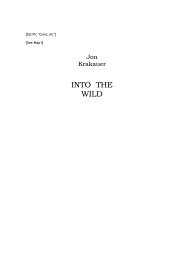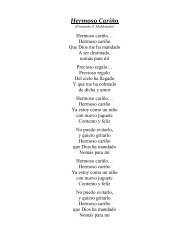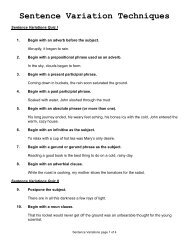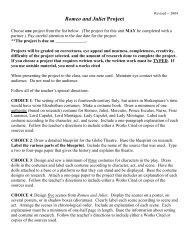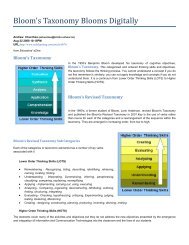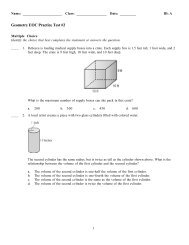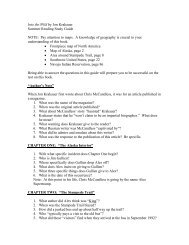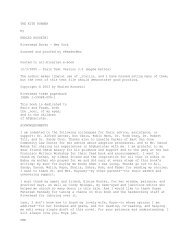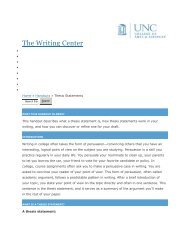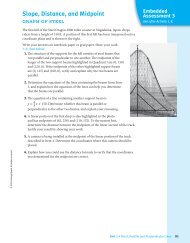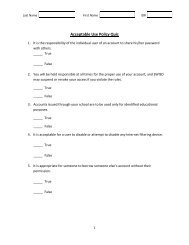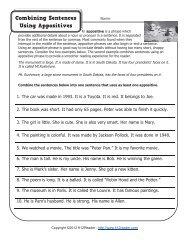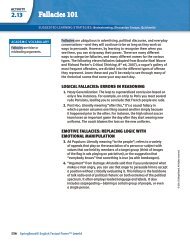Unit 1.pdf - Southwest High School
Unit 1.pdf - Southwest High School
Unit 1.pdf - Southwest High School
Create successful ePaper yourself
Turn your PDF publications into a flip-book with our unique Google optimized e-Paper software.
Activity 1.17<br />
continued<br />
© 2011 College Board. All rights reserved.<br />
5 The orderly came back in a few minutes with a rifle and five<br />
Chunk<br />
cartridges, and meanwhile some Burmans had arrived and told us<br />
3<br />
that the elephant was in the paddy fields 12 below, only a few hundred<br />
yards away. As I started forward practically the whole population of<br />
the quarter flocked out of the houses and followed me. They had seen<br />
the rifle and were all shouting excitedly that I was going to shoot the<br />
elephant. They had not shown much interest in the elephant when he<br />
was merely ravaging their homes, but it was different now that he was<br />
going to be shot. It was a bit of fun to them, as it would be to an English<br />
crowd; besides they wanted the meat. It made me vaguely uneasy. I had<br />
no intention of shooting the elephant—I had merely sent for the rifle to<br />
defend myself if necessary—and it is always unnerving to have a crowd<br />
following you. I marched down the hill, looking and feeling a fool, with<br />
the rifle over my shoulder and an ever growing army of people jostling<br />
at my heels. At the bottom, when you got away from the huts, there was<br />
a metaled road and beyond that a miry waste of paddy fields a thousand<br />
yards across, not yet plowed but soggy from the first rains and dotted<br />
with coarse grass. The elephant was standing eight yards from the road,<br />
his left side toward us. He took not the slightest notice of the crowd’s<br />
approach. He was tearing up bunches of grass, beating them against his<br />
knees to clean them, and stuffing them into his mouth.<br />
6 I had halted on the road. As soon as I saw the elephant I knew with<br />
perfect certainty that I ought not to shoot him. It is a serious matter to<br />
shoot a working elephant—it is comparable to destroying a huge and<br />
costly piece of machinery—and obviously one ought not to do it if it can<br />
possibly be avoided. And at that distance, peacefully eating, the elephant<br />
looked no more dangerous than a cow. I thought then and I think now<br />
that his attack of “must” was already passing off; in which case he would<br />
merely wander harmlessly about until the mahout came back and caught<br />
him. Moreover, I did not want in the least to shoot him. I decided that I<br />
would watch him a little while to make sure that he did not turn savage<br />
again, and then go home.<br />
7 But at that moment I glanced round at the crowd that had followed<br />
Chunk<br />
me. It was an immense crowd, two thousand at the least and growing<br />
4<br />
every minute. It blocked the road for a long distance on either side. I<br />
looked at the sea of yellow faces above the garish clothes—faces all happy<br />
and excited over this bit of fun, all certain that the elephant was going to<br />
be shot. They were watching me as they would watch a conjurer 13 about<br />
to perform a trick. They did not like me, but with the magical rifle in<br />
my hand I was momentarily worth watching. And suddenly I realized<br />
that I would have to shoot the elephant after all. The people expected<br />
it of me and I had got to do it; I could feel their two thousand wills<br />
12<br />
paddy fields: rice fields<br />
13<br />
conjurer: magician<br />
My Notes<br />
Grammar<br />
&<br />
Usage<br />
Verbals are verbs that are<br />
used as another part of<br />
speech. In English, two<br />
verbals—gerunds and<br />
participles—are formed<br />
by adding –ing to the<br />
base form of the verb.<br />
Gerunds acts as nouns,<br />
and participles act as<br />
adjectives. The title of<br />
this essay, “Shooting an<br />
Elephant,” is a gerund<br />
phrase; all three words<br />
act together as a noun.<br />
When Orwell writes of<br />
the “growing army,” he<br />
is using the participle<br />
“growing” to modify a<br />
noun. When he describes<br />
himself as “looking and<br />
feeling a fool,” he is<br />
using a participial phrase.<br />
Writers use verbals and<br />
verbal phrases to add<br />
action, as well as precise<br />
detail, to their writing.<br />
<strong>Unit</strong> 1 • Perception Is Everything 61



